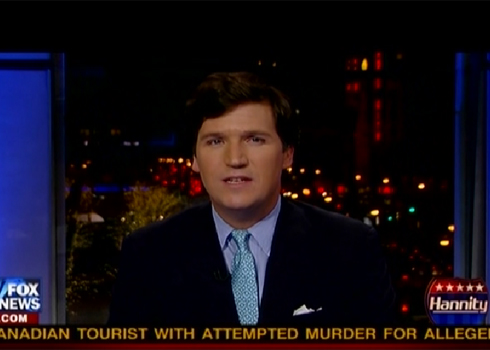Despite her long history of conservative and tea party advocacy, her recent lobbying gig, and her marriage to a Supreme Court Justice, Ginni Thomas’ new boss at The Daily Caller isn’t worried that his latest hire will cause editorial head aches for him and his staff.
“She is an old friend of my business partner Neil Patel,” said Tucker Carlson in a phone interview Tuesday morning. Carlson co-founded the Caller with Patel, a former Dick Cheney adviser, in January 2010. In recent weeks, the site has picked up some high-profile new employees, including former Slate and Newsweek blogger Mickey Kaus. But Carlson seemed genuinely bewildered by the reaction to his latest human resources decision.
“She was talking to [Patel] about all these not-so-well known political figures who might be interesting to interview…freshmen members, or people who are involved in the political process who don’t get a ton of attention.”
Thomas is no political shrinking violet. She’s made her name most recently as a conservative advocate and de facto lobbyist — publicly offering her services to clients of the advocacy group Liberty Central and its partner the Patrick Henry Center for Individual Liberty. She’s the wife of Supreme Court Justice Clarence Thomas, vocally opposes the health care reform law, and worked in 2010 to elect Republicans to Congress.
Buried in that curriculum vitae are potential conflicts of interest — past clients who may become sources, or subjects of articles. In a phone interview today, Carlson explained his standard to me.
“Nobody here is going to be interviewing anybody from whom he or she takes money,” he said emphatically.
It’s unclear whether Thomas has any ongoing business relationships with her political clients. When asked whether such relationships might still exist, Carlson said he didn’t know. The website for her firm Liberty Consulting was down as of Tuesday morning.
In cases where Thomas’ subjects or sources as a reporter are former clients, Carlson says the Caller will address disclosure on a case by case basis.
“It’s case by case,” he said, “you can fairly easily think of circumstances in which that would be unacceptable, and other cases in which it would be acceptable.”
As an example, Carlson hypothesized that a journalist could report out an expose of his former employer in a different profession without needing to recuse himself or disclose the past relationship. He likewise alluded to “buckraking” — the common, though questionable, practice among political journalists of speaking to interested parties for money, and then not disclosing those fees in future writings. Both types of potential conflicts of interest don’t concern him too much.
“Let your conscience be your guide — I mean we’re adults,” Carlson said. “Here are my rules: if you’re doing something you feel you need to hide, it’s probably the wrong thing. We’re not going to be hiding anything. We never have.”
Carlson’s looking forward to Thomas’ tenure, and noted that the scrutiny Tuesday should wait until she’s actually published a product for people to critique.
“We’re pretty comfortable policing the people who work here for conflicts, and we’ll continue to do that,” Carlson said. “If you think you see a conflict in any of our pieces, I hope you’ll point it out.”










